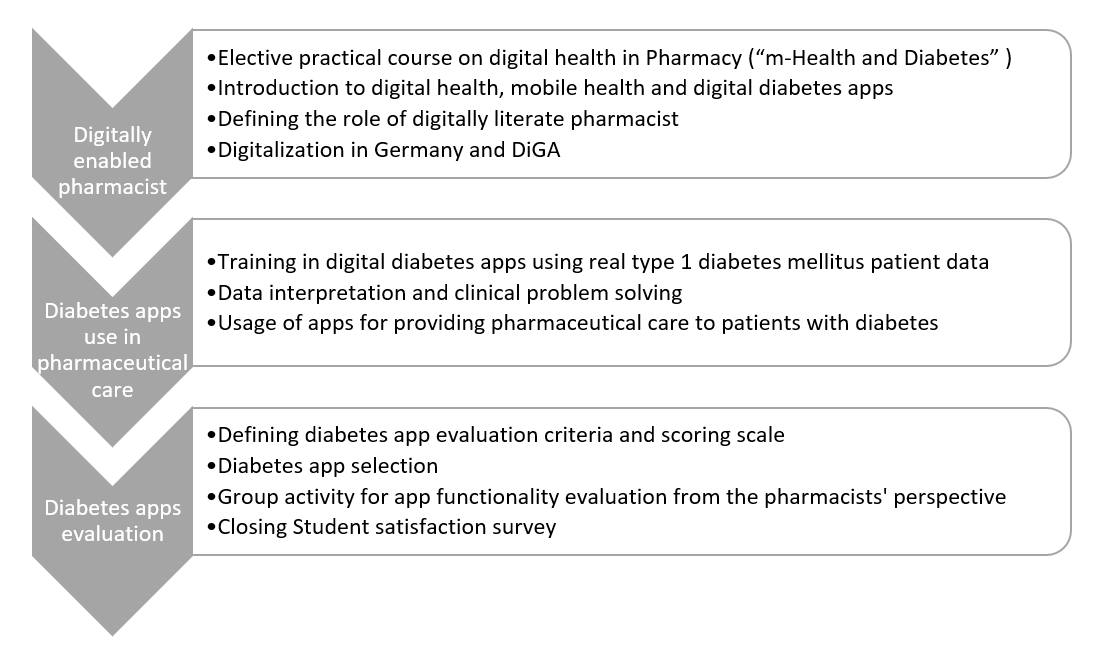Abstract
Germany was the first country worldwide to introduce prescription and reimbursement of digital health apps. To keep pace with recent digital healthcare developments and to prepare our pharmacy students for the digital pharmaceutical care services, the Institute of Clinical Pharmacy and Pharmacotherapy Heinrich Heine University (HHU) Düsseldorf introduced a one-of-a-kind elective practical course in m-Health and diabetes.
Keywords
m-Health, Digital diabetes apps, Diabetes mellitus, Pharmaceutical care, Education
Abbreviations
Apps: Applications; m-Health: mobile Health; DiGA: Digital health Applications
Introduction
Germany was the first country worldwide to implement German Digital Healthcare Act in 2019 to allow prescription and reimbursement of digital health applications (Digitale Gesundheitsanwendungen, DiGA) [1-2]. The German Federal Government has prioritized increased usage of mobile-Health (m-Health: use of mobile devices and digital technology in health care), recommending that physicians, other healthcare professionals, and patients work together to utilize the potential benefits of such technology. [3] Digital healthcare evolved quickly in the everyday delivery of pharmaceutical care in hospitals and community pharmacies [4].
To keep pace with the rapidly changing landscape in digital health in Germany, the Institute of Clinical Pharmacy and Pharmacotherapy at the Heinrich Heine University Düsseldorf developed and introduced an elective practical course in m-Health and diabetes in October 2019.
Aims and Methods of Pharmacy Course on m-Health Digital Diabetes Apps
By developing this elective practical pharmacy course on digital diabetes apps, the HHU Institute of Clinical Pharmacy and Pharmacotherapy is striving to train the next generation of pharmacists to be able to:
• use modern digital health technologies in pharmaceutical care delivery
• make digital technology accessible for the profession of pharmacy
• participate in interprofessional care teams involved in digital development.
To achieve these aims, the course focuses on improving the pharmaceutical care of diabetes patients via the use of m-Health diabetes apps. By learning how to use digital diabetes apps, final-year pharmacy students have the option of acquiring m-Health skills to solve clinical problems.
Figure 1. The elective “m-Health and Diabetes” course: Aims and Design
During the course, students were trained to use the different diabetes apps available on the German market, such as mySugr, One Drop Diabetes Management, Esysta, Diabetes Connect, Diabetes:M, One Touch Reveal, Lumind, and Si Diary. They became familiar with apps by entering real patient data, such as blood glucose levels, insulin dose, and carbohydrate intake. Furthermore, students learned how to interpret the patients’ blood glucose records using diabetes apps’ graphs and charts and apply clinical problem-solving to improve patient outcomes. In addition, students evaluated the usefulness of diabetes apps in providing pharmaceutical care to patients with diabetes.
Outcomes of the Elective Course
The elective “m-Health and Diabetes” course provided new digital skills to our pharmacy students, equipping them with the new competencies needed in the growing digital health care environment in diabetes. The final-semester pharmacy students could quickly learn and comprehend the features of the various diabetes apps, and use the information provided to promptly identify drug-related problems (e.g., hyperglycemia, hypoglycemia, glucose level variability, etc.) and use clinical and patient-centered problem-solving skills. Students evaluated the usefulness of various digital diabetes apps, indicating that these apps have many useful features relevant to pharmaceutical care services (e.g., adherence, insulin dose calculation, visualization of blood glucose regulation). In the recent elective practical course in February 2022, students evaluated four digital diabetes apps (Esysta, Diabetes:M, mySugr, and One-Touch Reveal). Course facilitators reevaluated the apps using four sets of anonymized data from real patients with type 1 diabetes. The app evaluation employed 25 predefined evaluation criteria, which included: 12 criteria related to pharmaceutical care (e.g., insulin dose and bolus calculation, adherence to medication, alarm functions); 8 criteria related to interoperability (e.g., interoperability with other devices/ software, communication between patients and pharmacists) and 5 criteria related to “other aspects” such as cost and data protection. All four assessed apps fulfilled at least 19 of the 25 evaluation criteria. Concerning the 12 criteria relevant to pharmaceutical care, mySugr, OneTouch Reveal, and Diabetes M met 11 criteria, and Esysta met 8 criteria. Of the eight criteria regarding interoperability with other devices or software, Esysta and Diabetes:M met 6 criteria, and mySugr and OneTouch Reveal 5 out of 8 criteria. However, no app provided direct communication between patients and pharmacists (criteria: interoperability), nor were pharmacists explicitly mentioned as health care providers by any app.
After completing this elective practical course, pharmacy students expressed high satisfaction with the course, felt enabled to care for their patients using diabetes apps, and expressed their interest in expanding the use of digital tools to other disease areas.
Discussion and Conclusion
Our elective practical “m-Health in Diabetes” course shows that final-semester pharmacy students are able to use diabetes apps, then incorporate the findings into the pharmaceutical care process. Educating our students to deliver pharmaceutical care using digital diabetes apps prepares them for digital healthcare provision now and in the future. However, to be able to fully utilize the benefits of pharmaceutical care using diabetes apps, app providers should provide a customized version that also includes pharmacists as part of an integrated healthcare team.
Author Contributions
“Conceptualization, E.O.; writing—original draft preparation, E.O., M.D., A.D., S.S., B.A., S.L; writing—review and editing, E.O., S.L., M.D., A.D., S.S., B.A. supervision, S.L; project administration: E.O., S.L., M.D., A.D., S.S., B.A., S.L.
All authors have read and agreed to the published version of the manuscript.
Acknowledgments
We thank Jennifer Sabernak, Emperra® for providing our facilitators and students Esysta App access for the elective practical in February 2022.
We thank Katherine Lyseng-Williamson, New Zealand for critically reviewing the article.
Conflicts of Interest
The authors declare no conflict of interest.
References
2. Digital health apps in Germany - An update on the DiGA journey. Available online: https://www.healthcareitnews.com/news/emea/digital-health-apps-germany-update-diga-journey; (accessed on 6th April 2022).
3. BMBF High Tech Strategy Gesundheit und Pflege. Available online: https://www.bmbf.de/bmbf/en/research/hightech-and-innovation/high-tech-strategy-2025/high-tech-strategy-2025.html; (accessed on 6th April 2022).
4. FIP Digital Health in Pharmacy Education. Available online: https://www.fip.org/file/4958; (accessed on 6th April 2022).

